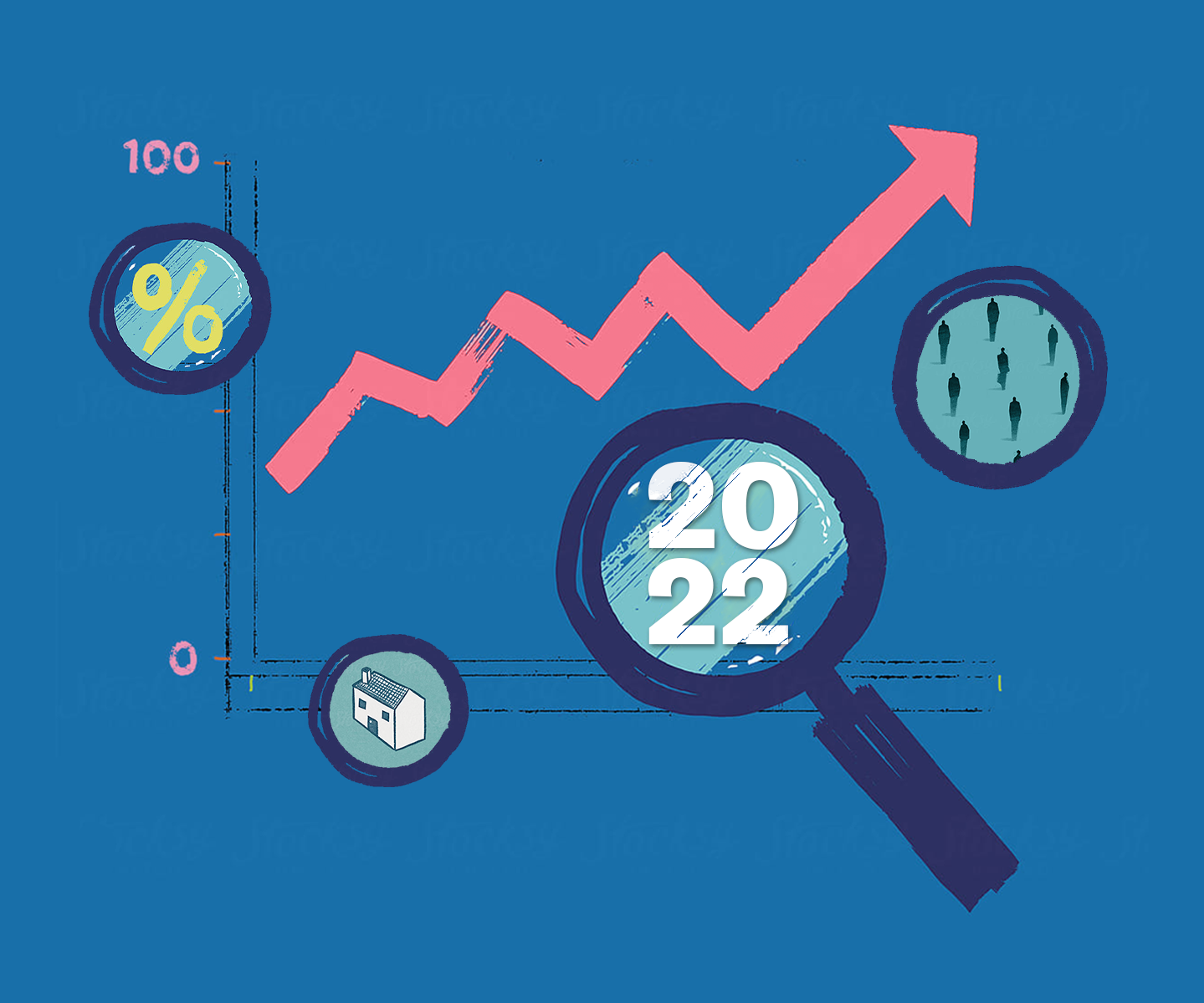“Unprecedented.” “Uncertainty.” “Disruption.” “Slowdown.”
These are the one-word labels some of the country’s top finance experts chose to slap on 2022, a year that would be considered the most transformative, unprecedented and uncertain in recent memory if not for the previous two.
It began with lingering supply chain challenges related to the spread of Omicron; record numbers walking off the job in the “Great Resignation;” an out of control housing market that only got hotter; and forecasts of slowing growth, with a chance of inflation. It ended with a series of aggressive interest rate hikes, a commodities crisis ignited by a major armed conflict in Europe, and whispers of an impending global recession.
The only major economic trend that held relatively steady was in the labour market, where talent shortages continue to keep unemployment low and talent scarce. In the rest of the economy the only constant was unprecedented change. With inflation at 6.9%, interest rates up 350 basis points in a year (as of October) and the country’s finance minister warning of “difficult days ahead,” the economic headwinds are only recognizable to those who were working in the 1980s. The rest of us can be forgiven for feeling like they’re trying to fly a kite through a hurricane.
Interest rates took a hike
Since the economy bounced back from the Great Recession of 2008 the world has been awash with cheap money at low interest rates. After the Bank of Canada announced the first of many interest rate hikes in March we have been rapidly transitioning to a world where capital comes at a much higher cost. Six consecutive rates hikes later (not to mention a seventh widely expected on December 7th) Canada now boasts the highest policy interest rate in the G7.
Will [inflation] get back to below 2%? Our bets from the top of the house at RBC are something just above 2% long-term.
Stuart Morrow, chief investment strategist at RBCWith business owners now needing to think twice before borrowing to invest in their business, demand will likely slow even further in 2023.
Inflation ran away
Like polio and fascism inflation felt like one of those out-dated problems our grandparents had already solved for us, but is now making an unwelcome comeback. The drivers of our current inflation challenge are many, and economists are divided on how and where it ends.
“The path forward for inflation will determine the path forward for interest rates, which is the key principle in determining the value of stocks, bonds and cash,” said RBC’s chief investment strategist Stuart Morrow. “There are leading indications that inflation is indeed slowing.”
Morrow is seeing signs that suggest the worst of the inflation nightmare is behind us. Housing costs and rents are starting to come down, as are used car prices, while inventories are back up to relatively normal levels following the supply chain crunch of 2021.
“We think inflation is high right now, definitely — it’s above central bank targets — but it starts to come down in the next one to two years,” he predicts. “Will it get back to below 2%, which is the central bank target for inflation? Our bets from the top of the house at RBC are something just above 2% long-term.”
CPA Canada’s chief economist David-Alexandre Brassard, however, isn’t convinced the end is nigh for inflation, given our track record on predicting the pattern thus far. He explains that at the start of the year many predicted a brief period of transitory inflation, and given how far off those predictions proved to be, he has trouble trusting such forecasts.
“Our understanding of inflation, and the limitation to which we can predict it, I think has been highlighted this year,” he said. “I suspect it might last longer than we expect.”
That suspicion is driven by a newfound appreciation for just how long it takes for changes in the economy to trickle down to the consumer. He says that on one side of the equation price pressure on producers can take months to trickle down to store shelves, and the same goes for interest rate hikes. That means that despite some optimistic indicators it could take a long time to take a serious bite out of inflation.
War remained good for absolutely nothing (sing it again)
One of the key drivers of inflation, and by extension rising interest rates, is a trend nobody had on their 2022 bingo card, other than perhaps the Kremlin (assuming they have bingo cards in Russia).
The economic ripple effects of Europe’s first major armed conflict since the end of the Second World War have touched nearly every part of the global economy, and Canadian businesses are not immune. When one of the world’s largest oil producers invades one of the world’s largest grain producers few corners of the economy are left unaffected.
“Inflation was already high in Canada, but the war in Ukraine has increased inflation,” said Pierre Cléroux, the chief economist of the Business Development Bank of Canada (BDC). “When you increase the price of wheat the price of almost every food is impacted; same thing with oil, which is not only the gasoline you put in your car but also the energy that’s used by the manufacturing sector, so it’s really having an impact on businesses.”
Cléroux adds that even though the conflict feels a world away it is already hitting home with Canada’s small businesses in the form of inflation, shipping delays and supply scarcity.
“The fact that the war has increased inflation has forced the bank of Canada to increase interest rates faster, and for businesses it’s not only increasing the cost of borrowing money, but slowing down some sectors of the economy,” he said.
The venture capital feast turned to famine
The year began with near record levels of venture capital flowing into Canadians businesses, and ended on the opposite end of the graph. In the first quarter of 2022 Canadian companies closed a combined $3.7 billion in financing, marking the second most active quarter for VC activity on record, behind only the second quarter of 2021.
I suspect that moving forward we’ll see more reliance on traditional banking channels for loans and access to credit
Andres Vinelli, chief economist with CFA Institute.In Q3 Canadian companies shared less than a billion dollars in combined financing, marking the first time quarterly fundraising slumped below a billion since COVID took a bite out of the economy in 2020, and a 71% drop from the start of the year.
“It’s going to be a more volatile environment; the number of deals we are seeing in private equity is down, so I suspect that moving forward we’ll see more reliance on traditional banking channels for loans and access to credit,” said Andres Vinelli, the chief economist of the CFA institute. “I also suspect that this will mean that corporates of all sizes will be looking at traditional IPOs more seriously.”
Vinelli explains that the low interest environment of the last few years inspired a move towards Special-purpose acquisition companies, or SPACs, rather than traditional IPOs.
“We saw a sudden stop of those this year, and if that is going to be less available, and the private markets and private equity will be less available, one option that looks more and more enticing is the traditional IPO funding,” he said.
The business fire sale was temporarily extinguished
Ownership of Canadian businesses might be changing more frequently in the years ahead, as aging Canadian entrepreneurs look to cash out. According to Cléroux of BDC, companies were starting to change hands at a faster pace at the start of the year, when the economy was still strong and cash was cheap. Despite recent economic developments he believes those trends will pick back up soon, and be a defining feature of small business activity in the years ahead.
“There’s a lot of entrepreneurs who are getting older — more than 100,000 are over 65 in Canada — so business transition will continue in the next five years, because people are at an age where they need to think about transition,” he said. “Yes the economy is slowing down this process, but it’s going to continue over time.”
The housing market took its first major step backwards in decades
Those who have watched the country’s red hot housing regions like Vancouver and Toronto over the last few decades are familiar with a market that only goes in one direction, and aggressively so.
That bubble finally started to burst in 2022. Toronto’s MLS Home Price Index is down 18% since its March peak, while Vancouver’s dipped 8.5% in just six months. Countrywide the average home price has dropped 20% since the Bank of Canada started upping interest rates.
“A lot of businesses working in the housing market are seeing the slowdown right now,” said Cléroux. “You could be in the construction industry, you could be selling to the construction industry, or in the real estate market, but this is having an impact on a lot of businesses”
Despite the recent slowdown in prices and sales activity, however, many — including Brassard of CPA — struggle to imagine the trend lasting very long. He explains that the government of Canada’s recently announced immigration plan, which targets nearly half a million newcomers every year for the next three years, will ensure a steady flow of new home buyers.
“That’s more than 1% of the population coming in year over year,” he said. “There’s going to be a push on housing, which is going to drive prices.”
Up until perhaps this year the discussion about climate effects had been quite abstract
Andres Vinelli, chief economist with CFA InstituteBrassard explains the steady flow of immigrants will ensure high demand for housing in major cities, while remote work spreads affordability issues further across the country.
“Ontario and B.C. are such immigration hubs that regardless of whether people leave, you’re still going to have a big push on housing demand,” said Brassard. “Nova Scotia and Prince Edward Island are seeing a greater push on inflation, and I suspect that’s because remote workers are moving into those provinces.”
The job market built immunity to interest rates
Prevailing economic wisdom suggests higher borrowing costs incentivize lower headcounts, as employers look to their payroll for cost-cutting opportunities in leaner times. Not so in the bizarre world of 2022, where the job market remained white hot despite steep hikes in the cost of borrowing.
Canada’s unemployment rate reached a new record low in May when it dipped to 5.1%, and despite the aforementioned economic forces that have rocked the economy ever since, only increased to 5.2% by October. By the second quarter of 2022 the country’s job vacancy rate had surpassed a million open positions, setting a new high water mark nearly doubling that of the pre-pandemic economy.
“This is a very unusual situation, because typically when the economy slows down you have more people looking for a job, but this time around is different,” said Cléroux of BDC. “It’s very difficult to recruit workers for two reasons: the economy has been performing well, so the unemployment rate is low, but also because we have an aging population.”
Even the country’s aggressive immigration strategy won’t be enough to stem the tide of the upcoming retirement wave, said Cléroux, with one in five working Canadians currently over the age of 55.
The country’s aging population will instead inspire businesses to seek more non-human alternatives, suggests Vinelli of the CFA institute.
“I think that we’ll be seeing more efforts to automate jobs at the lower end of the pay scale,” he said, pointing to self-checkout kiosks as one example. “That’s the market solution, because there’s just not enough people to do work that is traditionally low pay, low benefits.”
Climate risks became business risks
The effects of climate change get a little bit more noticeable with each passing year, but Vinelli believes 2022 might go down in history as the year the inconvenient truth reached the boardroom, and seeped its way into business strategy.
“Up until perhaps this year the discussion about climate effects had been quite abstract,” he said. “Now it’s a reality, now its palpable; we’re seeing it.”
Vinelli explains that prior to this year high-level conversations around climate were focussed on managing the effects of a carbon tax, or some other change in regulation. Increasingly, however, he says there is an expectation that climate related risks impact nearly ever business decision.
“As policymakers and regulators get more serious about incorporating [climate] risks the measures will be more precise, and the market will incorporate those risks in a more efficient manner,” he said. “That will have very important repercussions in how companies are financed, and what options investors have, but it’s not going to be linear; it’s mediated by the political process, and in these polarized times it will be stop-and-go.”
Supply chains quietly normalized
One of the few areas where economists are more optimistic is in the global supply chain. Twelve months ago constraints in global supply lines were causing huge delays, driving up costs and making everyone question the wisdom of a globally integrated economy.
“A big chunk of the economic problems that we saw in the world in general, and in the U.S. and Canada specifically, had been supply-chain driven,” Vinelli said. “They are on the mend, and have been for the last year, and this is something that is quietly happening in the background.”
We believe that the economy will slow down but we don’t believe it’s going to be a recession, just a slowdown
Pierre Cléroux, chief economist of the Business Development Bank of CanadaVinelli adds that rising interest rates have slowed demand, as has a transition in spending from goods to services with the end of COVID-related lockdowns. After all, 2022 was the first time since the start of the pandemic that most Canadians needed a vacation more than they did a bigger TV, home office equipment or a Peloton.
“Because of the pandemic there were delays at ports, there were [production] shut downs in China, and there was strong demand as well,” adds BDC’s Cléroux, explaining that at least two of those challenges have since been resolved. “The cost of shipping a container from China to North America went from $1,600 to $20,000, but now it’s back to normal, and the delays at North American ports are back to normal too.”
Will the New Year bring a global recession?
Looking ahead to 2023 most economists are fixated on one big unanswered question: will we see a major global recession?
“I think that inflation has started its path down back to a more normal level. That’s the good news,” said Vinelli. “The not-so-good news is we’re seeing a very real probability of a global synchronized recession.”
Morrow of RBC, won’t call it either way, though he admits growth is slowing in many sectors across the global economy. “We’re not going to say with certainty that it’s likely the Canadian or U.S. economy is headed for a recession in 2023,” he said. “The risks of a recession are growing, that is for sure, but at this point it’s still inconclusive.”
“I would say it’s 70-30 — a 70% chance it’s happening, 30% chance it’s not,” said Brassard of CPA Canada, adding that even if we see a technical recession he doesn’t predict we will see anything nearly as catastrophic as 2008. “It won’t be a shock, we’re just adjusting to higher interest rates; but it won’t be fun when you go to renew your mortgage and need to pay two or three times as much interest as you did before.”
The outlook is more upbeat over at BDC.
“We don’t think we’re going into recession,” Cléroux said. “We believe that the economy will slow down — it’s already slowing down now after two years of very strong growth — but we don’t believe it’s going to be a recession, just a slowdown.”
Cléroux adds that businesses will undoubtedly feel some economic pain, but says the effects will pale by comparison to the economic collapse of 2008.



